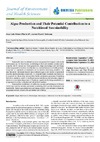Please use this identifier to cite or link to this item:
https://accedacris.ulpgc.es/jspui/handle/10553/70936
| Title: | Algae Production and Their Potential Contribution to a Nutritional Sustainability | Authors: | Gómez Pinchetti, Juan Luis Martel Quintana, Antera |
UNESCO Clasification: | 241707 Algología (ficología) | Keywords: | Algae Sustainable diets |
Issue Date: | 2016 | Journal: | Journal of Environmental Health Science and Engineering | Abstract: | Sustainable diets are defined as those that present low impacts both on the environment and the biodiversity, contributing to food and nutrition security and to a healthy life for present and future generations. Algae (macroalgae and microalgae, including cyanobacteria) have recently taken an increased interest as valuable products, being used as ingredients or condiments in the modern diversifying occidental cuisine. Moreover, nutritional research has confirmed algae as rich sources of potentially valuable, health-promoting compounds in a scenario where consumers are increasingly aware of the relationship between diet, health and disease prevention. Combining both ideas, nutritional needs vs. health promotion and disease risk reduction, algae are shown as a very interesting source of functional ingredients for being considered as a component of our day-to-day diet and related food products. Sustainability contribution of cultivation systems and techniques to biomass increasing in quality, security and control, so reducing effects on the environment and biodiversity, makes algae production a promising activity to be included in future developments toward a responsible and healthy way of living. | URI: | https://accedacris.ulpgc.es/handle/10553/70936 | ISSN: | 2378-6841 | DOI: | 10.15436/2378-6841.16.1101 | Source: | Journal of Environmental Health Science and Engineering [ISSN 2378-6841], vol. 2(3), p. 1-3 |
| Appears in Collections: | Artículos |
Page view(s)
108
checked on Jan 11, 2026
Download(s)
122
checked on Jan 11, 2026
Google ScholarTM
Check
Altmetric
Share
Export metadata
Items in accedaCRIS are protected by copyright, with all rights reserved, unless otherwise indicated.
